The 'Issue with Tissue': Report reveals which toilet paper brands are most environmentally friendly
Many major toilet paper brands source paper products through deforestation, according to a report released in September.
The nonprofit Natural Resources Defense Council’s [NRDC] fifth annual “Issue with Tissue” report analyzes major toilet paper brands based on their environmental footprint.
While the report shows there are more climate-friendly options than ever before, many major brands are getting a failing grade. Charmin, HDX, Quilted Northern, Up and Up, Kirkland Signature, Scott 1000, Amazon Basics, Angel Soft, Moxie, Great Value Ultra Strong, Cottonelle Ultra and Fiora all received an “F” grade.
“We created the ‘Issue of Tissue’ report and scorecard because so many consumers aren't aware that the tissue products in their homes are often made from forest fiber that can have widespread impacts on communities threatened species and the global climate,” said NRDC spokesperson Ashley Jordan. “And, what the scorecard finds this year is that many of the most popular U.S. brands, like Charmin toilet paper, are still being made almost entirely from forest fiber and part fiber from the Canadian boreal, which is a forest being threatened by widespread industrial logging.”
Cottonelle Professional and Great Value Soft and Strong got a D letter grade.
PlantPaper got a B grade along with Amazon Aware, Caboo and Who Gives a Crap.
The following companies got A letter grades: 365 Everyday Value, Trader Joe’s Bath Tissue, Field and Future by HEB, Seventh Generation Extra Soft and Strong, Ever Spring and Who Gives a Crap 100% recycled.
“Recycled content actually has just one-third of the carbon emissions and uses half as much water compared to forest fiber,” Jordan said. “So, that makes it the all-around environmentally preferred option for creating these tissue products.”
Some of the lowest-graded brands rely on forest fiber sourced from Canadian boreal forest, a massive area that represents 25% of the world’s remaining intact forest.
Canada’s boreal forest is home to more than 600 indigenous communities and is a habitat for a variety of threatened species.
“This forest is also the world's most carbon dense terrestrial ecosystem, which means that its protection is essential in the fight against global climate change,” Jordan said.
About 1 million acres are clear-cut from the forest each year for industrial logging. Proctor and Gamble, the producer that makes Charmin, is one of the only manufacturers to earn F grands for its brands across all five “Issue with Tissue” reports.
WRAL News reached out to Proctor and Gamble. A spokesperson said that for every tree that is chopped down, two more are planted. The company did not respond to requests for more information about that program or questions about if those newly planted trees would be used for future paper products.
“The simplest thing for consumers to look for are products that are labeled as being made from 100% recycled content,” Jordan said.









